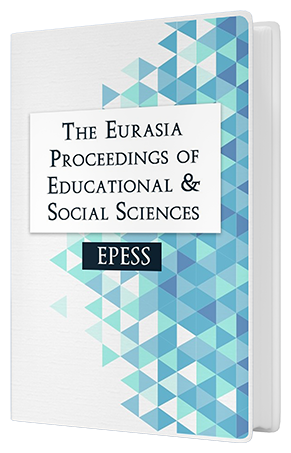Effect of Technology-Integrated Inquiry Based Learning Approach on Middle-School Students’ Conceptual Understanding of Lunar Eclipse
Keywords:
Technology integrated inquiry-based learning, Lunar eclipse, 6th grade StudentsAbstract
The aim of this study is to investigate the effects of technology-integrated inquiry based learning method and learning method that is based on the curriculum of science on the conceptual understanding shifts among students. In the research mixed explanatory model was harnessed. Sampling of the research consisted of 6th graders in a state middle-school. 33 students in one section constituted the test group whilst 29 students in a different section formed the control group. Members of test and control group were randomly assigned. Test- group students were taught in line with the learning method based on technology-integrated inquiry whereas control-group students received inquiry-based method as per the effective curriculum. In line with the aim of this research, “Conceptual Understanding Test” was administered to students as pretest and posttest before and after the learning process. In addition, a semi-structured interview was implemented among 9 students from each of the 2 groups. In the selection of students for this interview, their science grade from the previous year was examined. In the conceptual understanding test that was prepared as our data collection tool, 5 open-ended questions to measure 3 of the program acquisitions were included. The said questions entailed acquisitions on “the student can predict how lunar eclipse is formed”, “the student is informed about what phase the moon is in during lunar eclipse” and “the student is informed about the fact that lunar eclipse is not a regular phenomenon for each month”. 5-category grading key was utilized for the analysis. These categories comprised of “exactly true”, “partially true”, “scientifically invalid answer”, “non-codable” and “no answer” options. In the analysis of data, total score was computed by giving 4 points to “exactly true” category, 3 points to “partially true” category, 2 points to “scientifically invalid answer” category, 1 point to “non-codable” category and 0 point to “no answer” category. In the analysis of data, t-test for unrelated measurements was harnessed. Based on the answers obtained from data analysis it was evident that not a significant difference existed between technology-integrated inquiry based learning of lunar eclipse concept and inquiry-based learning that followed the curriculum format.Downloads
Published
Issue
Section
License
Copyright (c) 2019 The Eurasia Proceedings of Educational and Social Sciences

This work is licensed under a Creative Commons Attribution-NonCommercial-ShareAlike 4.0 International License.
The articles may be used for research, teaching, and private study purposes. Any substantial or systematic reproduction, redistribution, reselling, loan, sub-licensing, systematic supply, or distribution in any form to anyone is expressly forbidden. Authors alone are responsible for the contents of their articles. The journal owns the copyright of the articles. The publisher shall not be liable for any loss, actions, claims, proceedings, demand, or costs or damages whatsoever or howsoever caused arising directly or indirectly in connection with or arising out of the use of the research material. All authors are requested to disclose any actual or potential conflict of interest including any financial, personal or other relationships with other people or organizations regarding the submitted work.




